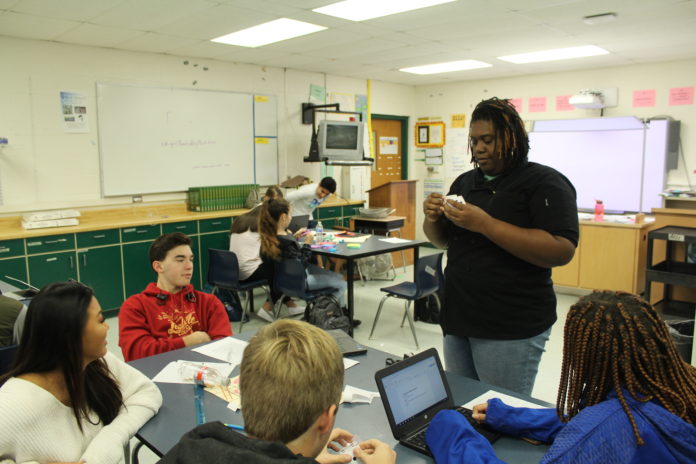
Chapel Hill High School’s new culinary teacher Jormeka Wilkins said she developed two passions as a child: food and airplanes.
“I love food because food is what brings people and families together,” she said. “At home, if you put out a pecan pie, gelato, ice cream or chicken, everybody’s coming to the table.”
Raised in Durham, Wilkins also became interested in aeronautics at a young age. A neighbor, who majored in agricultural science at Tuskegee University, recounted to her the history of the Tuskegee Airmen.
“He would say, ‘Tuskegee teaches you how to fly,’” Wilkins recalled. “ He also believed in farm-to-table. At the time it wasn’t called ‘farm-to-table,’ but he was into farming. A lot of his work was with food, along the lines of George Washington Carver.”
Wilkins said her own path into the culinary field “was a little eccentric.” After high school, she enrolled in Tuskegee University, the historically black school in Alabama where Carver himself taught for decades. Wilkins majored in biology.
“What really caught my attention was working with cancer research,” she said. She explained that after conducting an experiment extracting carotene from carrots and lycopene from tomatoes, she realized, “Oh, there is a way to incorporate food with science.”
The realization led her to apply to culinary school at the Art Institute of Raleigh-Durham, where she received an associate’s degree in culinary arts management. Since then, Wilkins has worked on developing diets.
She wants to create a diet “that can incorporate the foods that we love,” she said, “but not necessarily cause harm to us, increase our cholesterol, blood pressure, diabetes or such health risks that are in communities.” The kind of diet she envisions would take commitment since “it’s a mindset,” Wilkins said. “You have to have your mind set on wanting to live and eat better.”
Before entering teaching, Wilkins worked with Chartwells, a company that contracts with Chapel Hill-Carrboro City Schools (CHCCS) to provide food service. She was a food service manager—a “glorified cafeteria manager,” in her words. When she was hired, she said, she believed that she would use her love of food to join the effort in giving healthy food to Chartwells’s customers: students.
“The meal program here is pretty tedious, but I do like it. It is very nutritious. [Customers] have to be involved and have an appreciation for different dishes,” Wilkins said. “For me, it wasn’t just cafeteria food, because some of the recipes are developed offsite by chefs and registered dieticians. I thought I was going to be part of that movement.”
Wilkins said that several shortcuts taken by Chartwells disappointed her.
“When I saw one recipe on the menu, a curry dish, I just knew we were about to make curry from scratch,” she said. “It was not curry from scratch. It was, maybe, lemon juice with a roux. I was a little discouraged.”
In February, Wilkins began teaching sixth-grade science classes at schools in the Alamance-Burlington School System. The district does not offer a culinary program, so she soon set her sights on CHCCS.
“Chapel Hill is like the mecca of food,” Wilkins said. “It’s on the latest trends of food patterns, habits and development. There’s a food culture, so to speak.”
Wilkins’s first day at Chapel Hill High School was October 8. She teaches four periods of Foods I and one of Foods II, career and technical education (CTE) classes.
The culinary room is still being set up for the year, with some clutter yet to be removed. Five cooking stations are operational in the room, and Wilkins brought to the front a demo station that had been used for storage.
“I also have a stovetop and a water source on the demo station, so that when I do demos, the students will be able to see,” she said. “That’s definitely a privilege.”
Foods I students review food safety and sanitation, as well as nutrition, before they start cooking, Wilkins said, and student clubs have asked her Foods II class to cater a tapas lunch and bake 40 dozen cookies. Several of her culinary students will also go on a field trip in November.
“These are the students who I can hopefully motivate and coach, so that they can enter into competitions,” Wilkins said.
Sophomore Camryn Hunter, who will go on the field trip, said she signed up for Foods I to learn not just how to cook but to “know what goes with what, and how to pair foods.”
“I can’t yet apply my knowledge at home because we haven’t started cooking, but once we do, I would love to,” she said. “Mrs. Wilkins is pretty solid. There’s a lot of work before we get to the serious stuff of cooking, but she’s serious about getting us there. Cooking is not an easy task.”











